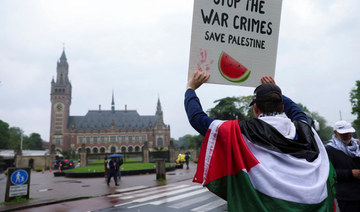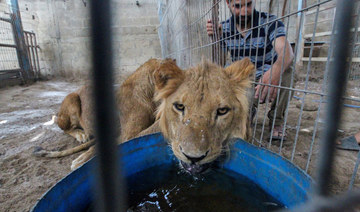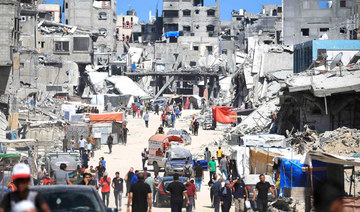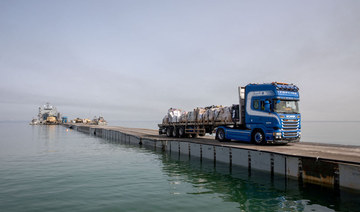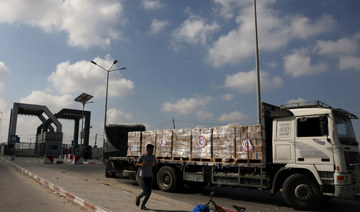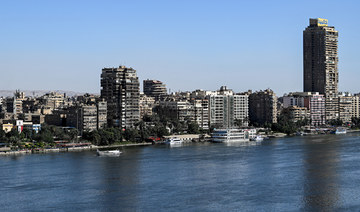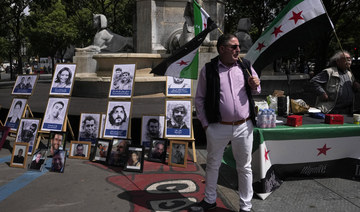CAIRO: Archaeologists on Sunday unveiled a restored colossal statue of Amenhotep III that was toppled in an earthquake more than 3,000 years ago at Egypt’s famed temple city of Luxor.
The statue showing him in a striding attitude was re-erected at the northern gate of the king’s funerary temple on the west bank of the Nile.
The temple is already famous for its existing 3,400-year-old Memnon colossi — twin statues of Amenhotep III whose reign archaeologists say marked the political and cultural zenith of ancient Egyptian civilization.
“These are up to now the highest standing effigies of an Egyptian king in striding attitude,” said German-Armenian archaeologist Hourig Sourouzian, who heads the project to conserve the temple. The world-famous twin Memnon colossi are 21 meters tall but show the pharaoh seated. The restored statue now stands again for the first time since its collapse 3,200 years ago, Sourouzian told AFP.
Consisting of 89 large pieces and numerous small fragments and reassembled since November, the monolith weighs 110 tons. It had lain broken in pieces after the earthquake in 1200 BC, Sourouzian said.
The statue shows the king wearing the white crown of Upper Egypt, and each hand holding a papyrus roll inscribed with his name, like the one standing next to it that was unveiled earlier this year.
His belt, holding a dagger with a falcon-head handle, is fastened with a rectangular clasp bearing the names of the king.
Pharaoh Amenhotep III inherited an empire that stretched from the Euphrates to Sudan, archaeologists say. The 18th dynasty ruler became king aged around 12, with his mother as regent. Amenhotep III died in around 1354 BC and was succeeded by his son Amenhotep IV, widely known as Akhenaten.
Colossal Amenhotep III statue unveiled in Luxor
Colossal Amenhotep III statue unveiled in Luxor

Gaza war is ‘real genocide,’ Spanish defense minister says
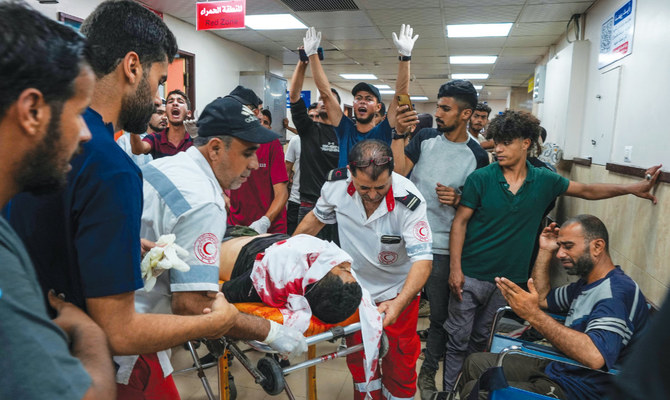
- Defense Minister Margarita Robles says Spain’s recognition of Palestine is not a move against Israel, adding that it is designed to help end violence in Gaza
MADRID: The Spanish defense minister said on Saturday that the conflict in Gaza is a “real genocide” as relations between Israel and Spain worsen following Madrid’s decision to recognize a Palestinian state.
Israel has strongly rejected accusations made against it by South Africa at the International Court of Justice that it is committing genocide against Palestinians, saying it is waging war on Hamas.
The remark by Spanish Defense Minister Margarita Robles in an interview with TVE state television echoed a comment by Spanish Deputy Prime Minister Yolanda Diaz, who earlier this week also described the Gaza conflict as a genocide.
“We cannot ignore what is happening in Gaza, which is a real genocide,” Robles said in the interview, during which she also discussed the Russian invasion of Ukraine and conflicts in Africa.
She also said Madrid’s recognition of Palestine was not a move against Israel, adding that it was designed to help “end violence in Gaza.”
“This is not against anyone, this is not against the Israeli state, this is not against the Israelis, who are people we respect,” she said.
Israel’s campaign in Gaza has killed nearly 36,000 Palestinians, according to Gaza health officials, and destroyed much of the enclave. Israel launched the operation to try to eliminate Hamas after the Palestinian group attacked southern Israel on Oct. 7.
Spain, along with Ireland and Norway, declared this week it would recognize a Palestinian state on May 28, prompting an angry response from Israel, which said it amounted to a “reward for terrorism” and recalled its ambassadors from the three capitals.
Judges at the ICJ, the top UN court, on Friday, ordered Israel to immediately halt its military assault on the southern Gaza city of Rafah, in a landmark emergency ruling in the case brought by South Africa accusing Israel of genocide.
On Saturday, Spain’s Foreign Minister Jose Manuel Albares said that Israel must obey the court’s ruling.
In a post on the social media site X, he said, “The International Court of Justice’s precautionary measures, including the cessation of Israel’s offensive in Rafah, are mandatory. We demand their application.”
South Africa has accused Israel of failing to uphold its obligations under the 1948 Genocide Convention.
Israel rejects the accusation, arguing it is acting to defend itself and fighting Hamas after the Oct. 7 attack.
Spanish Prime Minister Pedro Sanchez said on Wednesday that if more nations recognized the Palestinian state, it would add to international pressure for a ceasefire between Israel and Hamas.
Egyptian sports critic to sue authorities in Israel after Shin Bet confuses him with Hamas member
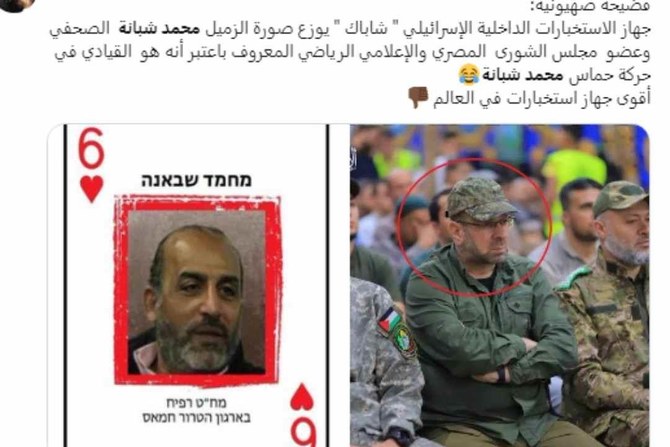
- Media expert Hassan Makawi says simple Internet search would have uncovered ‘appalling mistake’
- He says fiasco shows Israeli media reports ‘must be scrutinized closely’
CAIRO: Egyptian sports critic Mohamed Shabana plans to sue authorities in Israel for defamation after Israeli security agency Shin Bet published his photograph by mistake instead of an image of a Hamas leader in Rafah who it believed had been killed.
Shabana said he would demand substantial compensation for the damage inflicted on him, his family, and his audience in the Egyptian media.
He also said his political career was being damaged following the incident.
He said he would donate the compensation to the “Palestinian cause — a cause we all fight for.”
Shin Bet sparked controversy on social media after posting a picture of Shabana, claiming that he was a Hamas leader killed in Rafah.
Local Israeli media initially reported the assassination of Mohammed Shabana in Rafah, a leader of the Rafah brigade of the Al-Qassam Brigades, using an image of the Egyptian media personality.
However, the Israeli media immediately corrected the error, acknowledging the failure of the assassination attempt, as reported by Yedioth Ahronoth.
The blunder sparked an initial social media uproar, with the Egyptian sports audience recognizing Shabana, making a mockery of the incident.
The fiasco also raised doubts about the capabilities of Shin Bet, which not only posted the incorrect image of a Hamas leader but also failed in the assassination attempt.
Shabana told Arab News that he came across a photo of himself trending on social media, accompanied by sarcastic comments about the Israeli army.
He said: “I did not understand what was happening and began reading to grasp what had occurred.”
Shabana said some friends and family also contacted him over the phone to express their disbelief.
He added: “They joked that the Israeli security service had assassinated me, which made me laugh too. But it did not take long before I realized how ignorant and backward the Israeli security agencies were, fabricating events, which makes me doubt everything they say.
“I know that Shin Bet is one of the strongest security agencies in Israel, and it’s unnatural for them to make such a mistake.
“But I think the chaos in the Israeli state made them fabricate or even mishandle the accuracy of their publications.
“Perhaps they Googled the name Mohammed Shabana, the leader in Hamas, and my photo popped up, so they published it, which is quite ridiculous.”
Media expert Hassan Makawi said: “What happened is a major blunder for the Israeli security forces. But the bigger blunder, in my opinion, is that of the Israeli media, which followed its agency without verifying the facts.”
Makawi said a simple Internet search would have “uncovered their appalling mistake.”
Makawi told Arab News: “It’s clear that Israel is not as strong as they claim, nor is their media as reliable as it describes itself.
“Therefore, we must scrutinize their statements and publications as they may contain many lies.”
Heavy seas batter US Gaza maritime aid mission, CENTCOM says
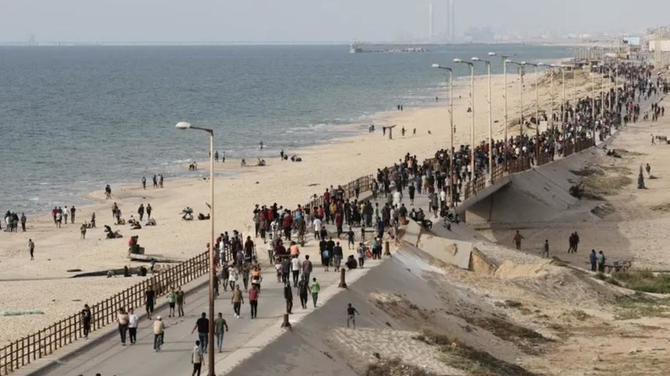
- No injuries were reported and the aid pier remains fully functional
TAMPA: Heavy seas battered the US maritime humanitarian mission to Gaza on Saturday, US Central Command (CENTCOM) said, with four vessels serving a floating aid delivery pier breaking free from their moorings.
No injuries were reported and the aid pier remains fully functional, CENTCOM said in a statement, adding that no US personnel would enter Gaza.
Two of the affected vessels were now anchored on the beach near the pier and the other two were beached on the coast of Israel near Ashkelon, CENTCOM said, adding that efforts to recover the vessels were under way with assistance from the Israeli Navy.
Rising cost of medicine in Egypt poses risk to ‘thousands of pharmacies’

- That review followed pharmaceutical companies’ request for price increases for various medications
- The EDA’s “decisions over (recent) years to raise the prices of certain types of medicine have resulted in the closure of about 1,500 pharmacies,” said Dr. Hatem El-Badawi
CAIRO: Pharmacy owners in Egypt have voiced concerns about the rising cost of pharmaceuticals in the country as they prepare for another price increase following the Egyptian Drug Authority’s recent review.
That review followed pharmaceutical companies’ request for price increases for various medications to “offset the rising costs of production, which have been exacerbated by the devaluation of the Egyptian pound against the dollar.”
The EDA’s “decisions over (recent) years to raise the prices of certain types of medicine have resulted in the closure of about 1,500 pharmacies,” said Dr. Hatem El-Badawi, secretary-general of the Pharmacy Division at the Federation of Egyptian Chambers of Commerce, adding that the “uncontrolled” rise in medicine prices has not been matched by a corresponding increase in profit margins for pharmacists.
“We anticipate more closures in 2024,” he added. “In February, the General Federation of Egyptian Chambers of Commerce appealed to the Central Bank governor to reactivate the low-interest rate loan of 5 percent for small and medium-sized pharmacies, capped at EGP500,000 ($10,600) per pharmacy.
“The goal was to safeguard pharmacies from economic challenges such as low purchasing power, cash payment demands from pharmaceutical companies, limited liquidity, rising operating costs, and shrinking profit margins.”
That proposal was rejected, however, and loans are currently only available at a 15-percent interest rate, which is, El-Badawi said, “far higher than a pharmacist’s profit margins and thus constitutes a loss.”
Pharmacy owner Dr. Sami Saad told Arab News: “We face several problems due to price increases, including reduced profit margins for pharmacists, dual pricing for drugs, and pharmaceutical companies not recalling expired products. All these issues could force us to close at any time because we are not making any profit.”
Saad added the Egyptian Drug Authority had not considered pharmacists’ demands or the crises they are facing.
“Every day is a struggle. And although I heard that the head of the authority plans to intervene to resolve these issues, there has been no progress so far,” he said.
Dr. El-Badawi reiterated: “I fear for the closure of pharmacies — a difficult situation that will only get worse. I am concerned for the 85,000 pharmacies across the country.
“The health of Egyptians is at risk,” he added. “I urge all responsible authorities to intervene.”
More than one in four Syrians ‘extremely poor’: World Bank
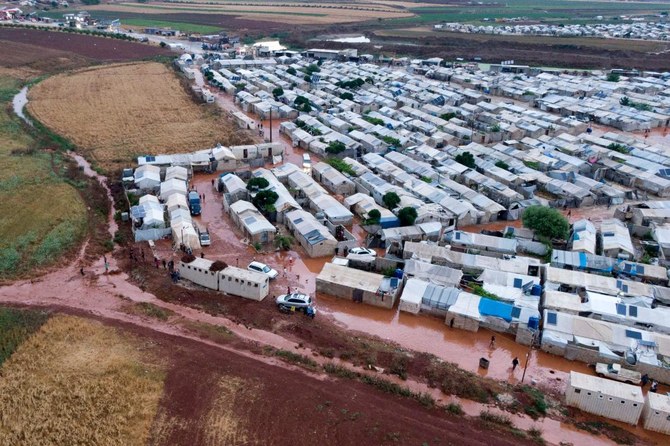
- 27 percent of Syrians — about 5.7 million individuals — live in extreme poverty
- “Continued funding shortfalls and limited access to humanitarian assistance” have further strained poor Syrians, the World Bank said
BEIRUT: More than a quarter of Syrians live in extreme poverty, the World Bank said Saturday, 13 years into a devastating civil war that has battered the economy and impoverished millions.
The World Bank published two new reports on Syria, which found that “27 percent of Syrians — about 5.7 million individuals — live in extreme poverty.”
“Extreme poverty, while virtually non-existent before the conflict, affected more than one in four Syrians in 2022” and might have further deteriorated after a deadly earthquake last year, one of the reports said.
The quake killed about 6,000 people in the country.
According to the United Nations, about 90 percent of Syrians live in poverty, while it previously estimated that around 2 million lived in extreme poverty after more than a decade of war.
The report cited neighbor Lebanon’s economic meltdown in late 2019, the Covid-19 pandemic and the war in Ukraine, as having eroded the welfare of Syrian households in recent years.
The civil war in Syria has also ravaged the economy, infrastructure and industry, while Western sanctions have added to the country’s woes.
“Continued funding shortfalls and limited access to humanitarian assistance” have further strained poor Syrians, already coping with “soaring prices, reduced access to essential services and rising unemployment,” the World Bank said.
The UN told AFP previously that its humanitarian response plan for Syria for 2024 requires more than $4 billion but that it is only six percent funded.
The international community is set to meet in Brussels Monday to try and muster funds for Syria at a yearly pledging conference.
A lack of opportunities and dwindling aid has pushed many Syrians to rely on money sent from relatives abroad to survive, with the World Bank estimating that “in 2022, the total value of remittances received by Syrian households reached about $1.05 billion.”
Syria’s estimated GDP stood at around $6.2 billion in 2023.
Syria’s “real GDP is projected to contract by 1.5 percent in 2024, extending the 1.2 percent decline in 2023,” the report said.
“Inflation is anticipated to remain high in 2024 due to the pass-through effects of currency depreciation, along with persistent shortages and potential further subsidy cuts (for) food and fuel,” it said.
Syria’s war has killed more than half a million people and displaced millions more since it erupted in 2011 after Damascus cracked down on anti-government protests.


